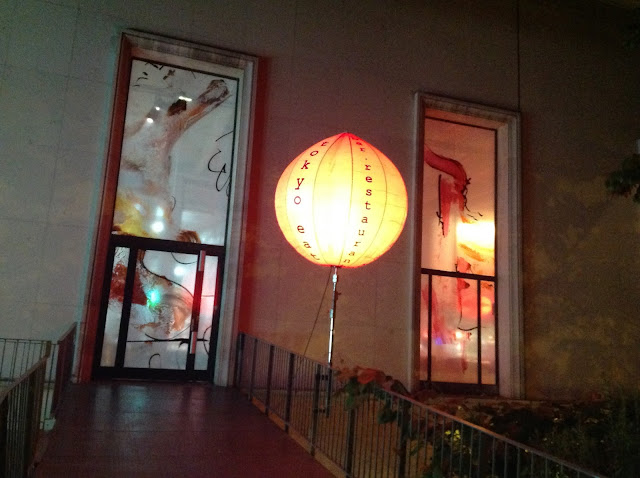Le Palais de Tokyo is one half, the west
wing, of a huge complex on the avenue du Président Wilson, just down the hill from
Trocadéro. Since the whole wing was finally brought into use in 2012 it
is now the biggest centre for contemporary art in Europe. Unlike most Paris
museums and art galleries it holds no permanent exhibitions of any kind. Its
function is to give space to a rolling programme of temporary installations and
works. Currently and until September one of the main offerings is a
labyrinthine exhibition, Rester vivant, by
novelist/poet/photographer Michel Houellebecq.
When it was first built in 1937 the plan was
to use what we now know as le Palais de Tokyo as the national museum of modern
art. However the mandarins reckoned without the war and the collapse of France.
In 1939 most of the paintings had to be packed up and carted off in a southerly
direction in an effort to keep them out of Nazi hands and in 1941 the basement
of the building was taken over by the Gestapo who needed somewhere to store the
hundreds of pianos they’d stolen off Jews who had fled or been arrested. That
bit of history is reflected in one of the offers the Palais makes to its
visitors: a guided visit round the Lasco Project, the only exhibition which has
gone on non-stop since 2012.
 |
Greek street art
|
You have to do a guided visit because the Lasco
artwork you see isn’t in any of the main exhibition spaces. It is hidden away underground,
in the corridors and stairways behind the public spaces of the Palais. A staff member has to get you through doors that are otherwise locked. Lasco is
street art and in keeping with the
form and its culture it is underground and secret. You’ll find work by artists such as Philippe Baudeloque, (www.baudeloque.com),
JR (jr-art.net), DRAN and others whose names I ought to know but don’t. (Checking
all this out after my visit I happened upon www.fatcap.com. I recommend it if
you don’t already know it. Street art, in all its guises, is one of the more
positive developments of global urbanization – definitely the most in-tune with
and reflective of the problems it raises anyhow.)
work by DRAN
 |
work by Philippe Baudeloque
|
Coming back to those pianos, there is a
part of the Palais which even the visitors to the Lasco project aren’t allowed
into. All you can see is a short video of the secret spaces below you in the
true basement of the building, where the wartime stolen pianos were kept: a
handful of men working to commemorate that time. Water drips from the low ceiling,
the candles they are using for light flicker and dim.
 |
photos taken from the video of the basement
|
It’s 10 o’ clock in the evening when I do
that visit (visits are that time every day and at midday on Wednesdays,
Saturdays and Sundays. The Palais is open from midday till midnight every day
except Tuesday). When I come out at ten to eleven I find the street has filled
with people. Wherever you can catch a glimpse of the Tour Eiffel there’s a
crush of people waiting for the 14 juillet fireworks. I decide to stay and see
them too. I wouldn’t have come out specially but now I’m here why not?
I’m sucked into the crowd, scrunched up
against a drunk young woman who’s obviously got something stronger than water
in the bottle she’s clutching, and an Arab-speaking family, one child already
asleep and mum looking like she’d rather be anywhere but here but dad’s got his
camera out so they have to stay. The crowd is good-humoured and patient. The Tour
Eiffel glitters and sparkles, takes on bleu, blanc, rouge and then goes dark.
Fire runs up the sides, falls away, flares out again. Flowers of colour and
light blossom overhead.
 |
fireworks seen from the musée d'art moderne de la ville de Paris
|
The bangs get louder and faster. I watch a little while
then squeeze my way through the press and set off back to Etoile and the Champs
Elysées. The giant flag billows under the Arc. There’s music, laughter, dancing
even. No one knows. Not yet.







